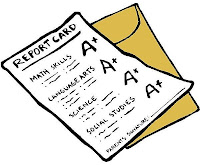Tyler Rice
Mr. Rice is a science teacher at a rural public high school in Washington located on a major Indian Reservation. He feels strongly about technology integration, inquiry, research-based instructional practices, innovation, and most of all, teaching kids.
Post #1
This week, I read Mr. Rice's post titled, "Meaningful Grading". It described how he doesn't like the standard way that teachers have graded forever. He has started a new grading technique for his classes in which he doesn't grade every assignment and homework that his students complete. Rather, at the completion of each project his students do, he has them self assess the quality of their work and the level of standard attainment. The self assessment includes a reflection on the project, a rubric, and a meeting between Mr. Rice and the student. His students also get involved in their own learning by setting learning goals through negotiations with him. All of this will increase the participation and the care of each student.
I told Mr. Rice how similar his grading strategy is to the EDM310 class I am in. We do not get grades for every project, activity, or blog post we complete. Rather, we self evaluate ourselves twice within the semester, and then come to an agreement with Dr. Strange as to what grade we deserve. I like this idea because I think it gives students a sense of freedom, where they are making more decisions on their own. Having more freedom gives students a sense of self-determination to where they want to succeed and do well.
Post #2
Mr. Rice's post this week was called, "Depth or Breadth? Yes, Please!", which was about the debate, depth vs. breadth in education. He said that teachers' do not have to choose between depth or breadth in their classrooms. Students should be able to experience both contents to the fullest. In his 9th grade class, Mr. Rice's students studied the issue of salmon and dams along the Columbia River for six weeks. They were able to cover many science concepts by staying on this topic for a number of weeks. He said that the answer to this debate is not only depth or breadth, rather it's "asking kids to wrestle with complex, messy, challenging, real world topics." To do this, the students will need to develop a real understanding of the contents and apply it in a meaningful and memorable way.
I thought that this was an interesting post. I, too, feel that one shouldn't have to choose either breadth or depth when teaching their students. Why can't students experience both? I thought that Mr. Rice, being able to cover the issue of salmon and dams for six weeks was incredible. His students had the opportunity to experience depth, while also having breadth because he covered a lot of different science concepts in these weeks.


No comments:
Post a Comment